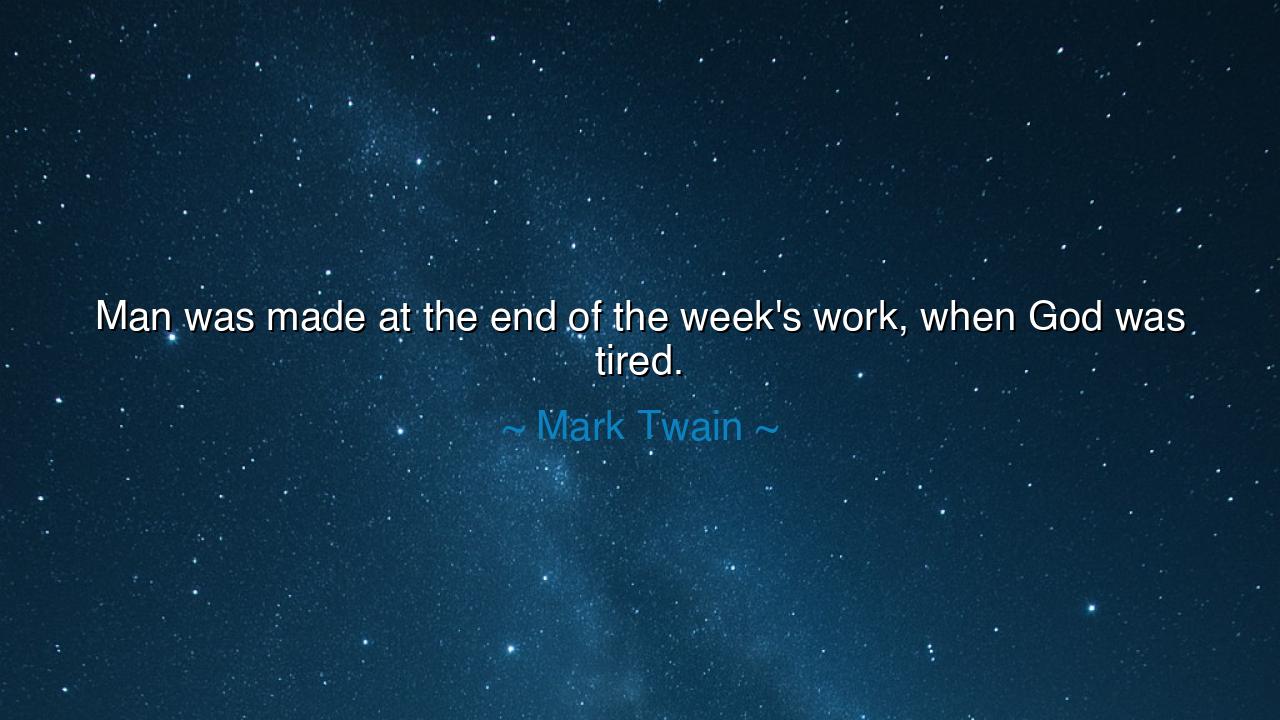
Man was made at the end of the week's work, when God was tired.






In the chronicles of creation, it is told that the heavens and the earth were shaped by divine hands, each day bringing forth wonders: the light and the darkness, the waters and the land, the creatures of sky and sea. On the final day, as the grand work neared its end, Man was formed — fragile yet ambitious, wise yet foolish. Mark Twain, master of wit and truth veiled in jest, declares that this was done when God was tired, as though humanity itself were the imperfect afterthought of a weary Creator. In these words lies both humor and a piercing reflection upon the flaws of mankind.
This quote speaks to the contradictions within the human spirit. Unlike the perfect harmony of the stars or the steadfast order of the seasons, Man is marked by chaos, error, and restlessness. Twain suggests that these imperfections are not by chance, but by the very moment of our making — a time when even divine hands faltered under the weight of exhaustion. Thus, humanity’s struggles, its follies and misdeeds, are as ancient as its birth, woven into its very nature.
Yet, hidden in this jest is a profound humility. If Man was shaped when the divine was weary, then we are creatures of limits and imperfection, not meant to rule with arrogance but to walk the earth with wonder and care. Our failings are reminders that we are not gods, but dreamers stumbling through the world, learning as we go. This truth binds us not to despair, but to compassion — for if all are born of the same flawed moment, none are beyond forgiveness.
The origin of Twain’s words rests in his gift of satire, a tool to reveal deep truths beneath laughter. With a single jest, he captures the tragedy and comedy of existence: that we are at once the crown of creation and its most troublesome child. Let this teaching be passed down to future generations — to laugh at our flaws, to accept our limits, and to strive, even in imperfection, toward a greater harmony. For though we were made when God was tired, we carry within us the spark to rise above the moment of our making.






NBPhuong, Nguyen Bich
Twain’s quote brings up an interesting reflection on the nature of humanity. The idea that man was created at the end of God’s workweek implies that perhaps we were the product of weariness or happenstance. How do you interpret this—does it suggest a deeper meaning about our purpose, or is it just a satirical way of describing human flaws?
CHCuong Ha
Mark Twain’s remark is a witty commentary on human nature. The idea of being created at the end of a ‘week’s work’ suggests that humans might not be God’s best creation. Do you think this idea speaks to the imperfections we experience, or is it just a clever way to reflect on our existence in a lighthearted manner?
PTLuyen Pham Thi
This quote by Twain makes me think about how we often view ourselves in the grand scheme of things. Are we really a result of divine exhaustion, or is it a playful critique of human behavior? How does humor like this shape our perspective on life and our place in the universe?
LDLe Dat
Mark Twain’s quote is humorous, but it also offers an interesting perspective on human nature. The idea that man was created when God was tired almost implies that humans are imperfect by design. Do you think Twain is suggesting that we’re inherently flawed, or is he just poking fun at our limitations?